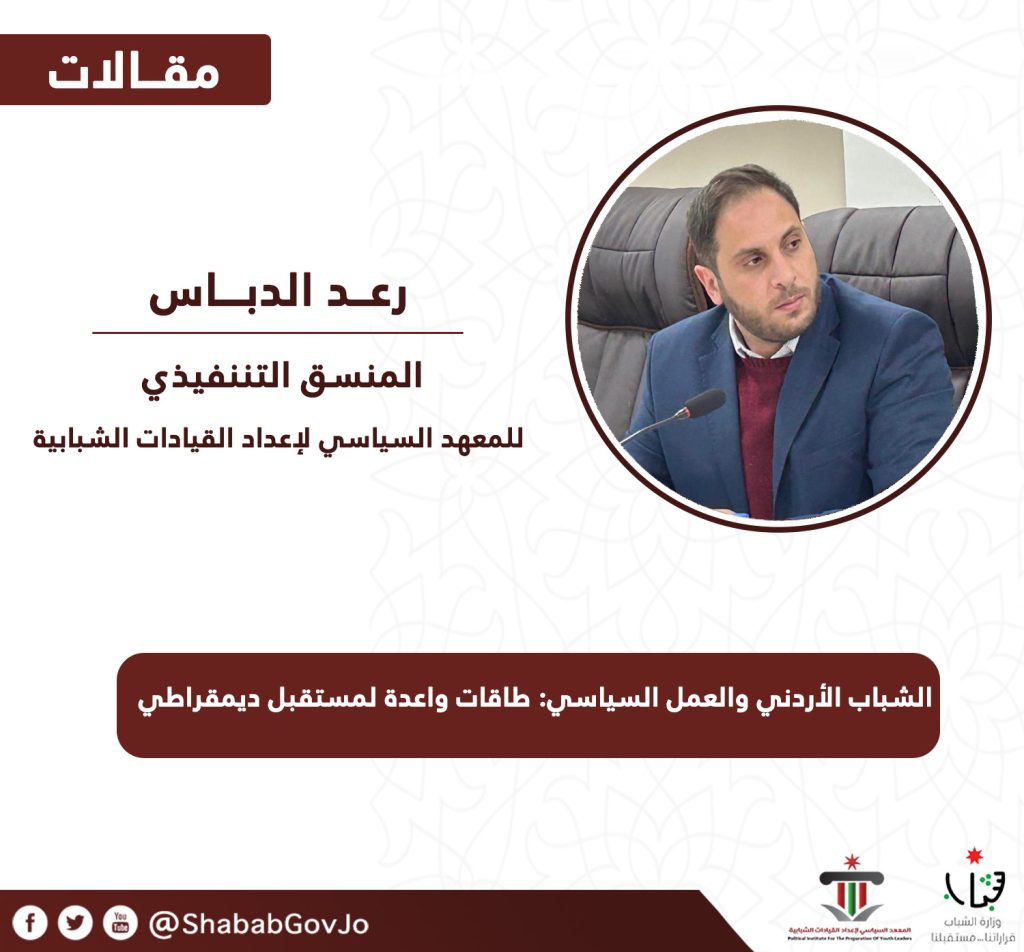Jordanian Youth and Political Engagement: Promising Energies for a Democratic Future

Engineer Raed Al-Dabbas
Article Title: Jordanian Youth and Political Engagement: Promising Energies for a Democratic Future
Jordanian youth today are a fundamental pillar of nation-building. They constitute the largest share of the population and possess immense intellectual and creative energies capable of driving positive change across sectors. As political, economic, and social challenges grow, the urgent need to enhance youth participation in political and civic life becomes clear—youth are the force that can renew public life and advance reform and development.
Why youth political participation matters
Involving young people in politics is not a luxury—it is a national necessity for stability and continuity. Youth are not merely recipients of policies and decisions; they are active citizens who must help shape them and influence choices that affect their lives and futures. Global experience shows that societies that strengthen youth participation in governance achieve higher levels of transparency, accountability, and sustainable development.
Reality and challenges
Despite initiatives to empower Jordanian youth politically, challenges persist: weak youth representation in elected bodies, limited opportunities within political parties, and a general sense of exclusion or ineffectiveness—all of which dampen willingness to engage in public life. Prevailing social attitudes can also sideline youth by questioning their capabilities or downplaying the importance of their participation.
The role of the state and institutions in empowerment
The Jordanian state has a central responsibility to create an enabling environment that encourages youth political engagement—by upgrading education to include civic education and political participation, supporting youth initiatives on campuses and in communities, and funding programs for political and leadership training.
Civil society plays a complementary role: building awareness, providing platforms for dialogue, and running projects that raise youth competencies in political participation, decision-making, and community advocacy.
Civic participation as a pathway into politics
Political work does not start only in parliaments or parties. It can take root in the simplest forms of civic engagement: volunteering, community initiatives, and local councils. These activities cultivate leadership and responsibility and prepare youth for larger political roles.
The Political Institute’s role and importance
1) Core roles of the Institute
- Raising political awareness: Equipping youth with understanding of national issues so they can grasp political challenges and take informed positions.
- Preparing future leaders: Providing knowledge and skills for leadership through trainings and workshops that simulate political reality.
- Fostering participation values: Encouraging engagement in public and political life; strengthening democracy, active citizenship, and national belonging.
- Building dialogue and debate capacities: Offering a forum for expression, learning respectful disagreement, critical thinking, and negotiation.
- Bridging theory and practice: Through political simulations and practical training within parties or public institutions, trainees gain hands-on understanding of the landscape.
2) Societal importance of the Institute
- Bridging the leadership gap: Supplying a pipeline of leaders able to steward state institutions and parties in the future.
- Reducing extremism and apathy: Channeling youth energies toward positive political action rather than extremism or withdrawal.
- Enhancing political stability: By preparing aware, well-trained leaders.
- Creating active civil-society cadres: Impact extends beyond politics to community, media, and cultural spheres.
Message
Jordan—with its rich history and political and social heritage—cannot realize its reform and development aspirations without its youth. They are the hope of the present and the makers of the future. Investing their energies in political and community life is not only a national duty; it is the true guarantee of a modern democratic state grounded in participation, justice, and representation.